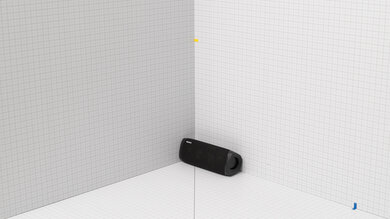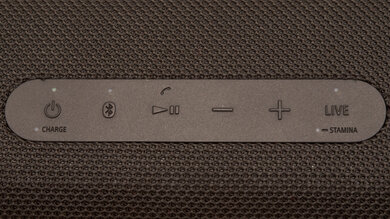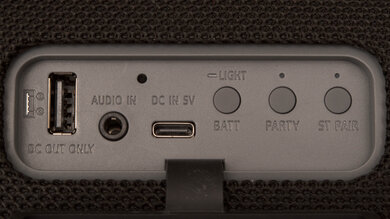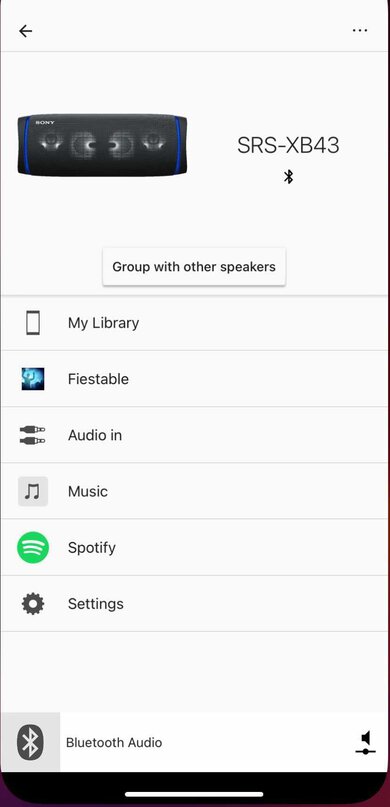The Sony SRS-XB43 is a well-built, portable speaker that you can use either horizontally or vertically. It has customizable lighting and an IP67 rating for dust and water resistance that certifies it to be fully dust-tight and immersible in up to a meter of water for 30 minutes. Like many Sony speakers we've tested, it supports ClearAudio+, which is advertised to adjust your speaker's sound field to your audio. Unfortunately, even with its EXTRA BASS and Sony ClearAudio+ features activated, the XB43 has an uneven sound profile that struggles to reproduce a thumpy low-bass. Its soundstage is uneven and narrow, too. However, there's a graphic EQ featured in its Sony Music Center companion app, which you can use to customize its sound to your liking.
Our Verdict
The Sony XB43 is fair for music. It has a balanced mid-range that ensures vocals and lead instruments sound clear and present in the mix. However, its underemphasized treble can make higher frequencies sound dull or veiled. Also, it struggles to reproduce low-bass, even with its EXTRA BASS preset turned on. Fortunately, you do have some ability to customize its sound to your liking using the graphic EQ in the Sony Music Center app. While it gets loud, its soundstage is narrow, and there's some compression present when you play it at max volume.
- Supports multi-device pairing.
- Graphic EQ and presets.
- Compression artifacts at max volume.
- Narrow soundstage.
The Sony XB43 is middling for videos and movies. Even with its EXTRA BASS preset turned on, it struggles to produce low-bass, so you don't feel the deep thump in action-packed scenes. Its soundstage is narrow and directional, which doesn't create a very immersive listening experience. Fortunately, its latency with iOS and Android devices via Bluetooth is low, so your audio should sync up with the images you see. That said, some apps compensate for latency differently, and your experience may vary.
- Low latency via Bluetooth.
- Compression artifacts at max volume.
- Narrow soundstage.
The Sony XB43 is decent for podcasts. Its balanced mid-range can reproduce vocals clearly, though its underemphasized treble range can make higher-frequency sounds a bit dull and veiled. You can adjust its sound profile using the EQ in the Sony Music Center app. It gets pretty loud, but unfortunately, there are some compression artifacts present when you play it at max volume.
- Portable design.
- Supports multi-device pairing.
- Compression artifacts at max volume.
The Sony XB43 doesn't have any built-in voice assistant capabilities, so it just uses the system on your paired smartphone. As part of our methodology, we use recorded voice commands to test the speaker. However, the speaker didn't respond to some of these commands, even when there isn't any ambient noise present. While it responded to a normal speaking voice, this isn't part of our testing process.
- Portable design.
- No built-in voice assistant.
The Sony XB43 is great for outdoor use. It has an IP67 rating for dust and water resistance, so you can take it outdoors with you without needing to worry about it getting a bit dusty or wet from some light rain. It feels durable, and since it's battery-operated, it's very portable. It lasts around 15 hours off of a single charge, which is incredible, and there are lots of power-saving features available. However, its soundstage isn't very immersive, and there's some compression present when you play it at max volume.
- IP67 rating.
- Portable design.
- Compression artifacts at max volume.
Changelog
- Updated Aug 23, 2022: Changed the test result for 'EQ' from 'Graphic' to 'Graphic + Presets' in the App box.
- Updated Aug 19, 2022: Added a comparison with the Sony SRS-XE300 in the 'Voice Assistants' box.
- Updated Aug 09, 2022: Added a comparison with the Sony SRS-XE200 in the 'Portability' and 'Voice Assistant' boxes.
- Updated Jan 13, 2022: Updated review for accuracy and clarity.
Check Price
Differences Between Sizes And Variants
The Sony SRS-XB43 Extra Bass comes in 'Black', 'Taupe', and 'Blue'. We tested the 'Black' variant, and you can see the label for the model we tested here. We expect the other color variants to perform similarly.
If you come across another version of the Sony SRS-XB43, let us know in the discussions, and we'll update our review.
Popular Speaker Comparisons
The Sony SRS-XB43 is a speaker from Sony's Extra Bass series. Like the Sony SRS-XB33, you can use it either horizontally or vertically, and it supports ClearAudio+, which is advertised to adjust your speaker's sound field to your audio. Even though it has an EXTRA BASS preset, it still struggles to reproduce low-bass, its overall sound profile is quite uneven, and its soundstage is very narrow. Fortunately, it offers a graphic EQ to help you customize its sound.
Check out our recommendations for the best Bluetooth speakers, the best portable Bluetooth speakers, and the best Bluetooth speakers for bass.
The JBL Xtreme 3 and the Sony SRS-XB43 are similar speakers, so depending on your listening habits, you may prefer one over the other. The JBL is better built and has a better soundstage performance. However, the Sony has a longer battery life and supports voice assistants.
The Sony SRS-XB43 is a better speaker than the JBL Charge 4 overall. The Sony has a better-balanced sound profile that can produce more bass than the JBL. It features a graphic EQ you can use to customize its sound to your liking. It also supports voice assistants through your smartphone, though its performance isn't very good. Also, it has a longer battery life, lasting around 15 hours from a single charge, though this can vary depending on your usage habits. The JBL is slightly smaller and more portable than the Sony. It also has fewer compression artifacts present at max volume.
The JBL Xtreme 2 is a slightly better speaker than the Sony SRS-XB43. The JBL has a better soundstage performance, resulting in a more immersive sound. It can also understand you more easily when using your smartphone's voice assistant. However, the Sony has a graphic EQ that lets you customize its sound profile.
The Sony SRS-XG300 is a slightly better speaker than the Sony SRS-XB43, though not by much. The XG300's sound profile is slightly more balanced and has a wider-sounding soundstage. It also gets a touch louder. The XB43's battery life lasted almost an hour longer in our tests, though this varies depending on your chosen volume levels and settings. Overall, the differences between the two speakers are pretty minor, so unless you're very particular about your speaker's sound, the XB43 offers similar performance at a more affordable price.
Test Results

The Sony SRS-XB43 has a similar design to the Sony SRS-XB33, but it's a bit bigger. It has a rectangular shape with passive radiators on each end. There are also lights on each side, and you can use the app to choose between lots of different colors. You can place the XB43 either vertically or horizontally. It comes in several different colors, too. If you're looking for a larger Sony speaker you can use at parties, check out the Sony GTK-XB72, which also comes with customizable RGB lights.
The Sony SRS-XB43 has excellent portability. This small speaker is fairly lightweight and can be held in one hand, making it easy to bring along with you when you're on the move. It's also battery-powered, so you don't have to worry about needing to plug it into an outlet for it to work when taking it outdoors with you. If you're looking for a smaller, more portable Sony speaker, check out the Sony SRS-XE200.
The Sony SRS-XB43 has a very good build quality. It's rated IP67 for dust and water resistance, meaning it's certified to be fully dust-tight and immersible in up to a meter of water for 30 minutes. Overall, it has a durable feel, and the thick netting wrapping around most of the speaker doesn't seem like it could rip easily. There's also a rubber flap in the rear that protects the opening for the inputs.
The Sony XB43's controls are impressive. On top of the speaker, there are physical buttons that let you power it on/off, activate Bluetooth pairing, play/pause your audio, adjust the volume, and enter 'LIVE' or 'STAMINA' modes. The 'LIVE' mode is advertised to create a more immersive, 3D audio experience, and the 'STAMINA' mode can help save battery life. You can press the Play button twice to skip to the next track and three times to skip to the previous track. The buttons are easy to press, and there are mini display lights on some of the buttons that show their status. On the back of the XB43, you can find the buttons for stereo pairing, Party Mode, and a Battery button that lets you activate the lights and hear the battery level of your speaker.
The Sony SRS-XB43's frequency response accuracy is okay. Its balanced mid-range ensures vocals and lead instruments sound clear and present in the mix. That said, due to the recessed treble, some higher-pitched voices and instruments can sound dark or dull. It also lacks low-bass, so you can't feel the deep thump and rumble in bass-heavy music like hip-hop and EDM, even with its EXTRA BASS preset enabled. Fortunately, you can tweak its sound to better suit your preferences, thanks to the graphic EQ featured in its companion app. That said, if you're looking for a speaker with a better-balanced sound profile out-of-the-box, check out the Harman/Kardon Onyx Studio 6.
Note: Our sound tests were performed with Sony's ClearAudio+ and EXTRA BASS features enabled. The ClearAudio+ feature is advertised to automatically detect your audio content and adjust the Sony XB43's sound field to better suit your audio. However, it can't be disabled if you just want to use the EXTRA BASS feature on its own.
The Sony SRS-XB43's soundstage is mediocre. Even though it's a stereo speaker, its directivity is poor. As a result, its soundstage is perceived as narrow and directional. Also, the overemphasis in the treble range can make the soundstage seem uneven. If you're looking for a similarly-sized speaker with a better soundstage performance, try the JBL Xtreme 3.
The Sony SRS-XB43's dynamics are alright. It can get fairly loud, so its sound can fill a large room. That said, there's compression present at max volume that may affect the quality of your audio during louder listening sessions. For a portable speaker with an outstanding dynamics performance, check out the Ultimate Ears HYPERBOOM.
The Sony SRS-XB43 has an impressive battery performance. In our testing, it lasted for 15 hours off of a single charge, which is outstanding. The manufacturer advertises that it can last 24 hours off a single charge if you set the volume to 31, turn off the lights, and activate STAMINA mode. That said, battery life can vary according to usage and whether you have EXTRA BASS or STAMINA MODE activated, meaning your experience may differ. The Sony XB43 also shuts off after 15 minutes without audio, which can help conserve its battery life. You can turn this power-saving feature off, too.
Since it doesn't have any voice assistants built-in, the Sony SRS-XB43 uses those available on your smartphone. We use recorded voice commands as part of our methodology to test the speaker's voice assistant performance. That said, it struggled to register these commands, even from close, and when there was no ambient noise present. However, like many Sony speakers we've tested, it could still understand commands from a normal speaking voice, though this isn't part of our testing process. For portable Sony speakers with better voice assistant performances, check out the Sony SRS-XE200 and the Sony SRS-XE300. If you're looking for a speaker with built-in voice assistants, check out the Bose Portable Smart Speaker, which comes with Alexa and Google Assistant built-in.
The Sony Music Center app is very good. There's a graphic EQ to help you customize the Sony XB43's sound to your liking. There's also its 'LIVE' preset that helps reproduce a more three-dimensional audio experience, and its 'EXTRA BASS' gives a more bass-heavy sound. There's a 'STAMINA' power-saving feature that cuts the speaker's bass to optimize its battery life. The app also features DJ effect options, including sound effects like 'Isolator', 'Notch', 'Jet', and 'Noise'. You can access the Fiestable app, which lets you control extra party features of the speaker. You can even pair the speaker with other speakers to create a stereo pair or cover a large area for a party.
The Sony SRS-XB43 has an AUX port that you can use to wire your smartphone to it to play audio. There's also a DC OUT ONLY USB-A port, which can charge a USB device, but you can't use it to playback audio. Also, there's an Audio IN jack.
The Sony SRS-XB43 has amazing Bluetooth connectivity. It supports multi-device pairing, so you can easily switch your audio source between your phone and your laptop. Also, you can touch your NFC-capable device to the speaker for quick Bluetooth pairing. Its latency with iOS and Android devices is low enough to be suitable for watching movies and videos. However, some apps compensate for latency differently, so your experience may vary.







